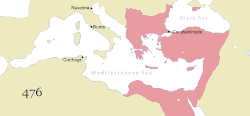Byzantine Empire under the Amorian dynasty
Byzantine Empire
| |||||||||||||||
|---|---|---|---|---|---|---|---|---|---|---|---|---|---|---|---|
• 820–829 | Michael II | ||||||||||||||
• 829–842 | Theophilos | ||||||||||||||
• 842–867 | Michael III | ||||||||||||||
| History | |||||||||||||||
• accession of Michael II | 820 | ||||||||||||||
• assassination of Michael III | 867 | ||||||||||||||
| |||||||||||||||
The Byzantine Empire under the Amorian dynasty (or Phrygian dynasty) ruled from 820 to 867. The Amorian dynasty continued the policy of restored
During the Second Iconoclasm, the Empire began to see systems resembling feudalism being put in place, with large and local landholders becoming increasingly prominent, receiving lands in return for military service to the central government.[2] Similar systems had been in place in the Roman Empire ever since the reign of Severus Alexander during the third century, when Roman soldiers and their heirs were granted lands on the condition of service to the Emperor.[3]
Amorian dynasty | ||
|---|---|---|
| Chronology | ||
|
||
| Succession | ||
|
||
| History of the Byzantine Empire |
|---|
 |
| Preceding |
|
| Early period (330–717) |
|
| Middle period (717–1204) |
| Late period (1204–1453) |
| Timeline |
| By topic |
|
|
Michael II
Michael was originally a high-ranking soldier serving under Emperor Michael I Rangabe of the Nikephorian dynasty. He aided Leo V in his overthrow of Michael I, but, as relations worsened between Leo and Michael, Leo eventually sentenced Michael to death. In response, Michael led a conspiracy that resulted in the assassination of Leo on Christmas 820. Taking the throne for himself, Michael II was immediately faced with a revolt by Thomas the Slav, which became a civil war that lasted four years and almost cost Michael the throne. Michael continued the practice of iconoclasm, which had been reinvigorated by Leo V.
The reign of Michael II saw two major military disasters that would have permanent effects on the Empire: the beginning of the Muslim conquest of Sicily, and the loss of Crete to the Saracens.
Michael was not popular among the Orthodox clergy, but he would prove himself a competent statesman and administrator, eventually bringing much-needed stability to the Empire following decades of strife and warfare and even restorations of the military. He was succeeded by his only son, Theophilos, upon his death in 829.
